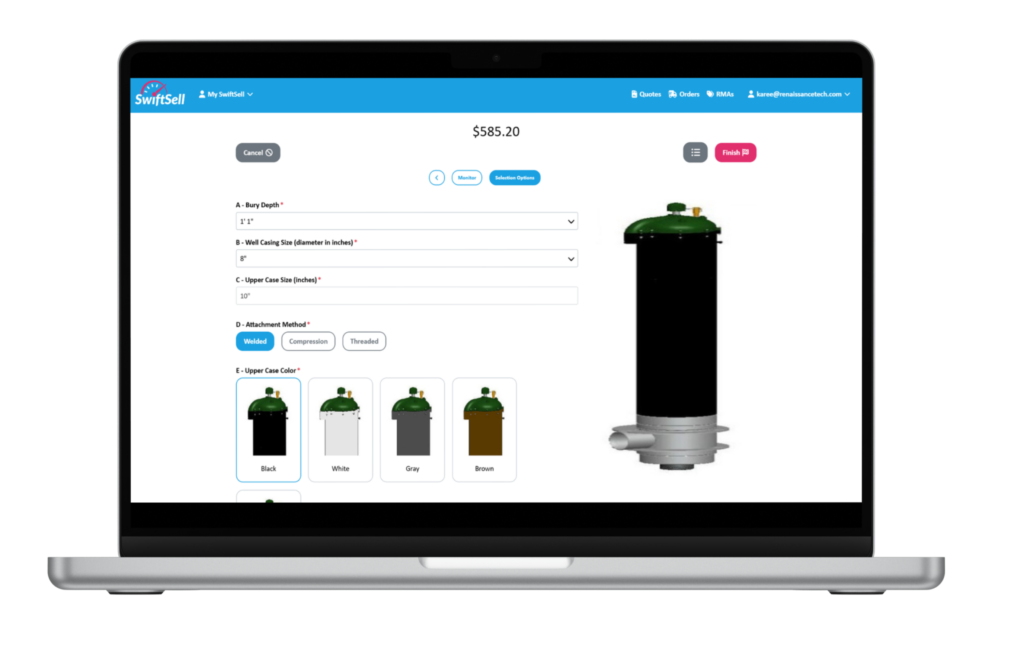How Manufacturers use Ecommerce to Grow Sales and Improve the Customer Experience
Ecommerce for manufacturers is no longer optional; it’s a core strategy for growth. By selling directly through online platforms, manufacturing companies can streamline sales, expand their reach, and deliver a better customer experience.
At its core, manufacturing ecommerce means setting up an online store or B2B portal where customers can browse, configure, and purchase products. Integrated with back-end systems like inventory management, order fulfillment, and CPQ (configure, price, quote) tools, ecommerce helps manufacturers operate more efficiently while boosting revenue.
What is Ecommerce for Manufacturers?

Ecommerce for manufacturers refers to using online platforms to sell products directly to consumers (B2C) or to other businesses (B2B). It helps manufacturers reach a wider audience, increasing sales and improving customer satisfaction by providing a convenient, easy-to-use online shopping experience.
Providing a digital buying experience for both B2C and B2B reduces the workload on internal teams and provides opportunity for growth around the clock. Manufacturers can reap the benefits of:
- Reaching a wider customer base
- A virtual storefront that sells 24/7
- Automation of shipping, tax, and payment processes
- Reduction of reliance on sales reps for standard orders
This shift to industrial ecommerce is transforming how manufacturers interact with customers, distributors, and global markets.
7 Ways Manufacturers Use Ecommerce
Manufacturers are leveraging ecommerce manufacturing solutions in multiple ways:
- Online Storefronts: Setting up an online store where customers can browse and purchase products. Features often include product configurators, real-time inventory updates, and automatic shipping and tax calculations.
- Direct-to-Consumer (B2C) Sales: Manufacturer ecommerce platforms allow companies to sell directly to consumers, expanding reach beyond dealers and distributors and boosting margins.
- B2B Ecommerce for Manufacturers: For B2B transactions, manufacturing ecommerce systems offer custom pricing, volume discounts, and account management tools for business.
- Integrated Order Fulfillment: Ecommerce platforms can sync with ERP and warehouse systems, ensuring fast, accurate shipping.
- Enhanced Customer Service: From FAQs to product manuals, ecommerce portals provide self-service resources and order tracking, reducing the load on support teams. Customers can access product manuals, FAQs, and other resources, as well as request returns or exchanges.
- Marketing and Advertising: Using analytics and customer data, manufacturers can launch targeted campaigns, personalized promotions, and retargeting ads.
- Global Market Expansion: Industrial ecommerce platforms allow manufacturers to expand internationally, reaching new customers worldwide.
The Role of CPQ in Manufacturing Ecommerce
CPQ for ecommerce (Configure, Price, Quote) tools are especially valuable for manufacturers selling complex or customizable products. They let buyers build their own product configurations online while automatically generating accurate pricing and quotes.
This integration reduces errors, speeds up the buying process, and enhances the overall ecommerce experience.
Conclusion
Ecommerce for manufacturers is revolutionizing the industry by driving efficiency, sales growth, and customer satisfaction. Whether through B2C, B2B, or global expansion, manufacturers that embrace ecommerce are better positioned to compete in today’s digital-first economy. Want to see our B2B and B2C ecommerce platform for manufacturing platform firsthand? Learn more about our product, SwiftSell, here, or schedule a demo below!
